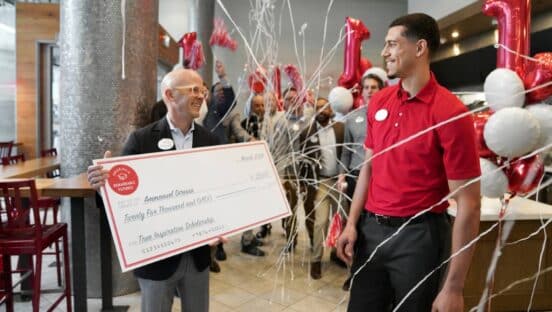Everyone in a company has a cause that’s close to his or her heart, but it’s the CEO’s job to select a charitable partner that connects with those who matter most—the customers—while balancing employees’ interests.
Selecting a cause that connects not only with consumers, but also with people within the company, is a critical element of the corporate giving strategy at Arby’s. This led the roast beef chain to develop a relationship with Share Our Strength’s “No Kid Hungry” program, which works to end childhood hunger in America, as part of its Arby’s Foundation.
Hala Moddelmog, president of the Atlanta-based restaurant company, says the Arby’s Foundation had been around for a number of years by the time she joined the company in 2010, and that it had done great work. But she says she didn’t feel it was making the deep connections it was ultimately capable of.
Early in the nonprofit-partner search, a team was assembled to identify a charity partner that would resonate with consumers, as well as with employees, franchisees, and even Arby’s suppliers.
“We actually had a strategic task force of stakeholders,” Moddelmog says. A third-party firm was also involved, so the team would have access to comprehensive information on what was available in the nonprofit world and how potential charitable partners would connect with stakeholders.
Burgerville, a Vancouver, Washington–based burger chain, looked to the artistic roots of its community for charitable direction and inspiration. “The Northwest has a rich undercurrent of local music talent that doesn’t really see a lot of exposure,” says Jeff Harvey, president and CEO.
When the opportunity arose to release a CD featuring area musicians, with proceeds benefiting the Portland Police Bureau Sunshine Division and other local emergency food-relief agencies, Harvey says, it struck a chord with both customers and employees. In-restaurant music is emphasized in a number of Burgerville stores, with some even holding live performances. “I said, ‘I think there’s something really significant there that guests would want to participate in,’” Harvey says.
While some CEOs look to their community for guidance, others choose charitable efforts that hit even closer to home. Steve Jackson, president of Hungry Howie’s Pizza in Madison Heights, Michigan, has a number of family members who have been affected by breast cancer. “There probably isn’t a person you know that doesn’t have a family member, friend, or neighbor that’s been touched by breast cancer,” Jackson says. The near ubiquity of the disease—from the CEO’s family to those of consumers—prompted Jackson’s team to look more closely at charity partners within the breast-cancer sector. “The more people I talked with on our franchise advisory council and within our marketing department, it was clearly evident that breast cancer was the charity for us to focus on,” he says.
Jackson says the idea of partnering with a breast-cancer charity began at the corporate level, but the final decision was a collective effort within the organization. The leadership team worked with franchisees and others associates to increase engagement at all levels. “If you can get a large percentage to embrace it, that’s the first step,” Jackson says.
Supporting a cause devoted to helping kids has been important to Auntie Anne’s since its early days. After searching for a way to evolve its charitable giving strategy, the team connected with Alex’s Lemonade Stand Foundation, which raises money to fight
childhood cancer.
“We rely heavily not only on the relationship we have with the guests that come to our counters, but also the relationship we have with our franchise partners,” says Bill Dunn, president and COO of the Pennsylvania-based brand. “We looked at all kinds of charities, but we came back to one that revolved around helping children.”
Dunn says he knew that charging ahead without getting widespread alignment within the organization would likely reduce the involvement of the company’s employees and franchise partners. Following a path that’s too driven by the passions of those at the C-level might also mean you “won’t be able to have the impact that you ultimately would like to have,” Dunn says.
Selecting partners for any corporate giving strategy is part of contributing to the brand’s culture, and Arby’s Moddelmog says CEOs should treat the process like anything else along those lines. “The leader really has to be intentional about setting the tone at the top,” she says. Establishing the right partnerships should also follow some central tenets: the cause should be an authentic part of the company culture, and be something employees and customers truly care about.
Dunn says CEOs should strive for a careful balance between providing direction and empowering employees to forge partnerships that are meaningful to them. “My personal style is to do a little of both,” he explains, “to have the discipline to know when I need to step in and influence, and at the same time recognize when a team is performing well.” Knowing when to follow one path or the other takes time, and various situations may merit different approaches. “You have to be disciplined enough to know when you need to be hands-on and when to be hands-off,” Dunn says. “It’s not one-size-fits-all.”













